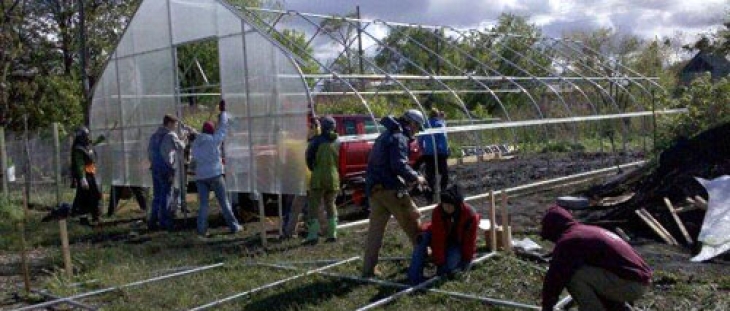
 Detroit Urban Sustainability Training (DUST) I’m turning off from Rosa Parks Boulevard in Detroit’s Corktown neighbourhood when I see my first city chicken. Actually, chickens. There’s a whole coop of them, sprawled over twice the breadth of a roomy Toronto backyard, and they’re massive–great golden hens that seem as though they were plucked right out of a Grant Wood painting and plunked, by some mysterious turn of fortune, into this incongruously urban landscape. We’ve been driving for only around ten minutes, but we’ve passed easily a dozen small farm plots. “This is Greg’s farm,” says my boyfriend’s brother Mike, a Detroit resident who, right now, is doubling as our tour guide. I look out the minivan window and see rough slashes of green rising from the black soil where, not so long ago, houses once stood. “We just saw him at the caf. He grows greens for a lot of the restaurants around here.” We drive a bit more. More crop rows, another chicken coop. In between them, houses. “There’s rumours that there’s a cow in Detroit,” says Mike. “It supposedly lives on the east side. But who knows.” Mike enjoys playing tour guide here. Along with my boyfriend, he grew up in the neighbouring ‘burbs–two and a half miles northwest of the city on Woodward, more or less. But today, this is his turf. It seems he knows every house, every garden, every livestock rumour (okay, just the one) and every community initiative. He dutifully points out these things-of-note as we pass along, as well as everything else. “And there’s a person!” he announces when we pass a single pedestrian ambling down the middle of the street. “There’s people here, too.” He may have been joking, but it’s the part about Detroit that, sometimes, we seem to forget. In the decades since the ’67 riot–or ‘rebellion,’ depending on whom you ask–Detroit has continued to exist as a city with the usual, if diminished, trappings. But, all the while, it’s taken on a parallel life as another thing altogether. Somewhere along the line, this living city became a symbol. And, like cities, symbols change. Detroit, long an emblem of thwarted American splendour, is redefining itself as a flexed bicep in the realm of people-driven action. The most notable sea change, as observed by both news media and my own tourist’s eye, is the city’s aggressive adoption of urban agriculture models. The work of entrepreneurial do-gooders, suburban transplants returned to their roots, and hosts of city dwellers who never left Detroit in the first place, farming initiatives are sprouting at a prodigious pace to ultimately put more than 25,000 acres of vacant property–nearly the spatial equivalent of San Francisco–to use in a food-production capacity. Because of these and other grassroots enterprises, the “industrial wasteland” and “ghost town” rhetoric that has come to define Detroit in the lexicon of our time is slowly but surely being rendered obsolete. On the way to Mike’s office–the final destination in our neighbourhood tour–we drive past the colourful exterior of Hostel Detroit, a non-profit youth hostel founded in November 2010 whose website states the provision of “safe, affordable accommodations in Detroit while educating patrons about the city” as its mandate. I notice that much of the language on the hostel’s ‘About Us’ page echoes that of discussions I’ve been overhearing of late, excited whisperings from expats and optimists alike over a cooperative realization of unbridled potential. “Hostel Detroit is truly a community and collaborative effort, taking ideas from community members and Hostel Detroit committee members,” it reads. “Community” and “collaboration” are words oft-repeated in the context of the new Detroit. I tell Mike about how exciting Detroit is to Torontonians, but I find it difficult to explain why. Maybe the intrigue is a product of Detroit’s simultaneous proximity and foreignness, its position as a place where Toronto-based Flickr accounts can be easily stocked with arty photos from inside abandoned industrial warehouses alongside documentation of others’ creative explosions in the same weekend visit. But it’s also the energy, and the promise. Toronto has weathered the global economic crisis better than most North American cities of its size; yet, it’s becoming increasingly difficult to ignore discussions punctuated by budgetary handwringing and the looming threat of service cuts. Meanwhile, comparably, Detroit has nothing to write home about in terms of government infrastructure and public resources–behind the scenes is a city still rife with corruption and cringe-inducing levels of mismanagement–yet, according to data released in July 2, it was one of only two U.S. metropolitan areas whose housing prices rose in the past year. How can a city with the odds so clearly stacked against it be experiencing such measurable progress now, while we in Toronto nervously await the dropping of some nefarious other shoe? As I ask myself this question from Mike’s office at Allied Media Projects, a non-profit organization responsible for setting up 13 media centres in Detroit’s digital deserts, my deep thoughts are interrupted by a brass band fanfare. A literal foursome of horn players have materialized, as if by magic, in the foyer, and they are extremely loud. When they’ve finished playing, a poster appears announcing their song as a “random act of culture” sponsored by the Knight Arts foundation. They thank us for listening, collect their belongings, and disappear from whence they came. Just another day in Detroit. __ Kelli Korducki is a regular contributor to Toronto Standard.
Detroit Urban Sustainability Training (DUST) I’m turning off from Rosa Parks Boulevard in Detroit’s Corktown neighbourhood when I see my first city chicken. Actually, chickens. There’s a whole coop of them, sprawled over twice the breadth of a roomy Toronto backyard, and they’re massive–great golden hens that seem as though they were plucked right out of a Grant Wood painting and plunked, by some mysterious turn of fortune, into this incongruously urban landscape. We’ve been driving for only around ten minutes, but we’ve passed easily a dozen small farm plots. “This is Greg’s farm,” says my boyfriend’s brother Mike, a Detroit resident who, right now, is doubling as our tour guide. I look out the minivan window and see rough slashes of green rising from the black soil where, not so long ago, houses once stood. “We just saw him at the caf. He grows greens for a lot of the restaurants around here.” We drive a bit more. More crop rows, another chicken coop. In between them, houses. “There’s rumours that there’s a cow in Detroit,” says Mike. “It supposedly lives on the east side. But who knows.” Mike enjoys playing tour guide here. Along with my boyfriend, he grew up in the neighbouring ‘burbs–two and a half miles northwest of the city on Woodward, more or less. But today, this is his turf. It seems he knows every house, every garden, every livestock rumour (okay, just the one) and every community initiative. He dutifully points out these things-of-note as we pass along, as well as everything else. “And there’s a person!” he announces when we pass a single pedestrian ambling down the middle of the street. “There’s people here, too.” He may have been joking, but it’s the part about Detroit that, sometimes, we seem to forget. In the decades since the ’67 riot–or ‘rebellion,’ depending on whom you ask–Detroit has continued to exist as a city with the usual, if diminished, trappings. But, all the while, it’s taken on a parallel life as another thing altogether. Somewhere along the line, this living city became a symbol. And, like cities, symbols change. Detroit, long an emblem of thwarted American splendour, is redefining itself as a flexed bicep in the realm of people-driven action. The most notable sea change, as observed by both news media and my own tourist’s eye, is the city’s aggressive adoption of urban agriculture models. The work of entrepreneurial do-gooders, suburban transplants returned to their roots, and hosts of city dwellers who never left Detroit in the first place, farming initiatives are sprouting at a prodigious pace to ultimately put more than 25,000 acres of vacant property–nearly the spatial equivalent of San Francisco–to use in a food-production capacity. Because of these and other grassroots enterprises, the “industrial wasteland” and “ghost town” rhetoric that has come to define Detroit in the lexicon of our time is slowly but surely being rendered obsolete. On the way to Mike’s office–the final destination in our neighbourhood tour–we drive past the colourful exterior of Hostel Detroit, a non-profit youth hostel founded in November 2010 whose website states the provision of “safe, affordable accommodations in Detroit while educating patrons about the city” as its mandate. I notice that much of the language on the hostel’s ‘About Us’ page echoes that of discussions I’ve been overhearing of late, excited whisperings from expats and optimists alike over a cooperative realization of unbridled potential. “Hostel Detroit is truly a community and collaborative effort, taking ideas from community members and Hostel Detroit committee members,” it reads. “Community” and “collaboration” are words oft-repeated in the context of the new Detroit. I tell Mike about how exciting Detroit is to Torontonians, but I find it difficult to explain why. Maybe the intrigue is a product of Detroit’s simultaneous proximity and foreignness, its position as a place where Toronto-based Flickr accounts can be easily stocked with arty photos from inside abandoned industrial warehouses alongside documentation of others’ creative explosions in the same weekend visit. But it’s also the energy, and the promise. Toronto has weathered the global economic crisis better than most North American cities of its size; yet, it’s becoming increasingly difficult to ignore discussions punctuated by budgetary handwringing and the looming threat of service cuts. Meanwhile, comparably, Detroit has nothing to write home about in terms of government infrastructure and public resources–behind the scenes is a city still rife with corruption and cringe-inducing levels of mismanagement–yet, according to data released in July 2, it was one of only two U.S. metropolitan areas whose housing prices rose in the past year. How can a city with the odds so clearly stacked against it be experiencing such measurable progress now, while we in Toronto nervously await the dropping of some nefarious other shoe? As I ask myself this question from Mike’s office at Allied Media Projects, a non-profit organization responsible for setting up 13 media centres in Detroit’s digital deserts, my deep thoughts are interrupted by a brass band fanfare. A literal foursome of horn players have materialized, as if by magic, in the foyer, and they are extremely loud. When they’ve finished playing, a poster appears announcing their song as a “random act of culture” sponsored by the Knight Arts foundation. They thank us for listening, collect their belongings, and disappear from whence they came. Just another day in Detroit. __ Kelli Korducki is a regular contributor to Toronto Standard.














